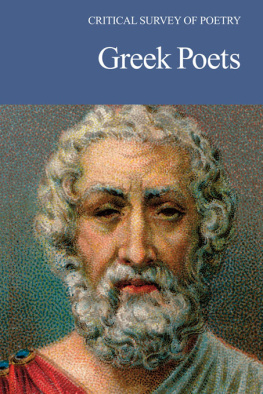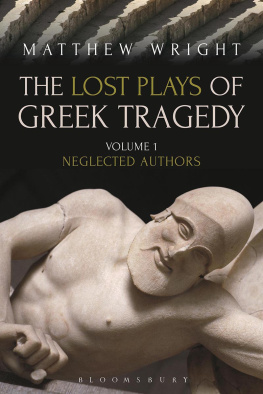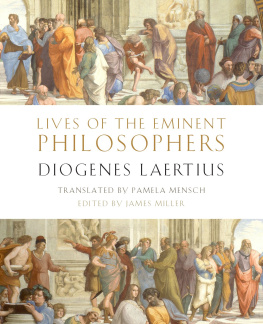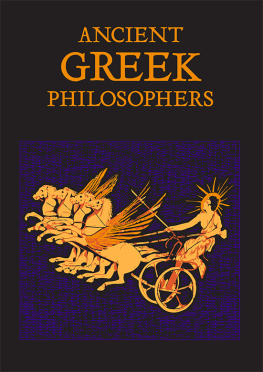All rights reserved. Except for brief passages quoted in a newspaper, magazine, radio, television, or website review, no part of this book may be reproduced in any form or by any means, electronic or mechanical, including photocopying and recording, or by any information storage and retrieval system, without permission in writing from the Publisher.
Versions of these translations have appeared before: Archilochos in the magazines Poetry and Arion and as a book, Carmina Arcbilocbi (Berkeley and Los Angeles: University of California Press, 1964); Sappho as a book, Sappho: Songs and Fragments (Ann Arbor: University of Michigan Press, 1965); Alkman in Arion (Winter 1969). Lukas Foss and Richard Swift have separately set some of the Archilochos fragments to music, and Swift has made a song of Alkmans The valleys are asleep and the mountaintops.
First published as New Directions Paperbook 799 in 1995.
7 Greeks / translations by Guy Davenport.
p. cm.
Heraldeitos Diogenes Herondas.
I. Greek literature Translations into English. I. Davenport,
Guy.
Introduction
Of the Greek poets of the seventh century BC we know almost nothing and none of their poems has come down to us entire. Archilochos was a professional soldier from the Aegean island of Paros; Sappho a member of a distinguished family on Lesbos, an island off the coast of Asia Minor; and AIkman was a slave and choirmaster in the Lydian city Sardis before he emigrated, or was sold to, Sparta, where he wrote the two hymns, to Artemis and Hera, which assure him a place all his own in literature.
Archilochos is the second poet of the West. Before him the archpoet Homer had written the two poems of Europe; never again would one imagination find the power to move two epics to completion and perfection. The clear minds of these archaic, island-dwelling Greeks survive in a few details only, fragment by fragment, a temple, a statue of Apollo with a poem engraved down the thighs, generous vases with designs abstract and geometric.
They decorated their houses and ships like Florentines and Japanese; they wrote poems like Englishmen of the court of Henry, Elizabeth, and James. They dressed like Samurai; all was bronze, terra cotta, painted marble, dyed wool, and banquets. Of the Arcadian Greece of Winckelmann and Walter Pater they were as ignorant as we of the ebony cities of Yoruba and Benin. The scholar poets of the Renaissance, Ambrogio Poliziano and Christopher Marlowe, whose vision of antiquity we have inherited, would have rejected as indecorous this seventh-century world half oriental, half Viking. Archilochos was both poet and mercenary. As a poet he was both satirist and lyricist. Iambic verse is his invention. He wrote the first beast fable known to us. He wrote marching songs, love lyrics of frail tenderness, elegies. But most of all he was what Meleager calls him, a thistle with graceful leaves. There is a tradition that wasps hover around his grave. To the ancients, both Greek and Roman, he was The Satirist.
We have what grammarians quote to illustrate a point of dialect or interesting use of the subjunctive; we have brief quotations by admiring critics; and we have papyrus fragments, scrap paper from the households of Alexandria, with which third-class mummies were wrapped and stuffed. All else is lost. Horace and Catullus, like all cultivated readers, had Archilochos complete in their libraries.
Even in the tattered version we have of Archilochos, some three hundred fragments and about forty paraphrases and indirect quotations in the Bud edition (1958, revised 1968) of Professors Lasserre and Bonnard, a good half of them beyond conjecture as to context, so ragged the papyrus, or brief (grape, curled wool, short sword) the extraordinary form of his mind is discernible. Not all poets can be so broken and still compel attention.
Like the brutal but gallant Landsknecht Urs Graf, both artist and soldier, or the condottiere, poet, military engineer, and courtly amorist Sigismondo Malatesto of Rimini, Archilochos )(Kept his two services in an unlikely harmony. Ares did not complain that this ashspear fighter wrote poems, and the Muses have heard everything and did not mind that their horsetail-helmeted servant sometimes spoke with the vocabulary of a paratrooper sergeant, though the high-minded Spartans banned Archilochoss poems for their mockery of uncritical bravery. And the people of his native Paros made it clear, when they honored him with a monument, that they thought him a great poet in spite of his nettle tongue.
Apollo in an ancient conceit read Archilochos with delight and was of the opinion that his poems would last as long as mankind. Hasten on, Wayfarer, Archilochoss tomb bore for inscription, lest you stir up the hornets. Leonidas the epigrammatist imagined the Muses hopelessly in love with Archilochos, and Delian Apollo to boot, for how else account for such melody, such verve? Quintilian admired his richness of blood, meaning liveliness, we suppose, and his abundance of muscle. Plutarch in his essay on music places Archilochos among the innovators of metric, and Horace, imitating Archilochos, congratulated himself on bringing Greek numbers into Italy. Pindar called him Archilochos the Scold. Writers as different as Milton, who mentions him in the Areopagitica as trying the patience of the defenders of the freedom of speech, and Wyndham Lewis, who spits like a cat at his reputation, took his satiric talent for granted without really knowing what he wrote. Hipponax alone among the archaic poets, we are told, has as sharpened a stylus as Archilochos, and Hipponax is remembered for a grim little couplet:
Woman is twice a pleasure to man,
The wedding night and her funeral.
Though he is said to have written with venom and, according to Gaitylikos, splashed Helicon with gore, we have no evidence of anything so caustic. We have to take antiquitys word for it, or assume that the Panhellenes were far touchier than we about satire. Certainly their sense of honor was of an iron strictness. To mock, a Greek proverb goes, is to thumb through Archilochos. The longer your letters, the better, Aristophanes complimented a friend, like the poems of Archilochos.
It is precisely the tone of Archilochos that gives us a problem with no solution. In 1974 a new poem of Archilochoss was published in R. Merkelbachs and M.L. Wests Zeitschrift fr Papyrologie und Epigraphik. It was discovered on a papyrus mummy wrapping, identified and edited (ten years work it was) by Anton Fackelmann, translated here as Fragment 18. Its tone would be aesthetically difficult even if we were surer of its meaning. Our fortune in having it at all is immense and vies in importance with the utterly new dimension of lyric poetry which it gives to our tentative and sketchy knowledge of the dawn of European literature. Is it a comic poem, a raucous anecdote with a hilarious punch line? Is it frankly an erotic poem (Peter Green has waggishly titled it The Last Tango in Paros). There is nothing in Greek literature like its last three stanzas. We can understand the robust bawdy of Aristophanes and Herondas, the vivid eroticism of Sappho and Anakreon, but these lines of Archilochossung in barracks, on the march, in village squares, at singing contests?are they satire or salacity, private or public? I would like to believe that it is a satiric collision of a love song and a biological fact, the kind of comedy you get if Juliet on her balcony had dislodged a flowerpot in her ecstasy and beaned Romeo below.









